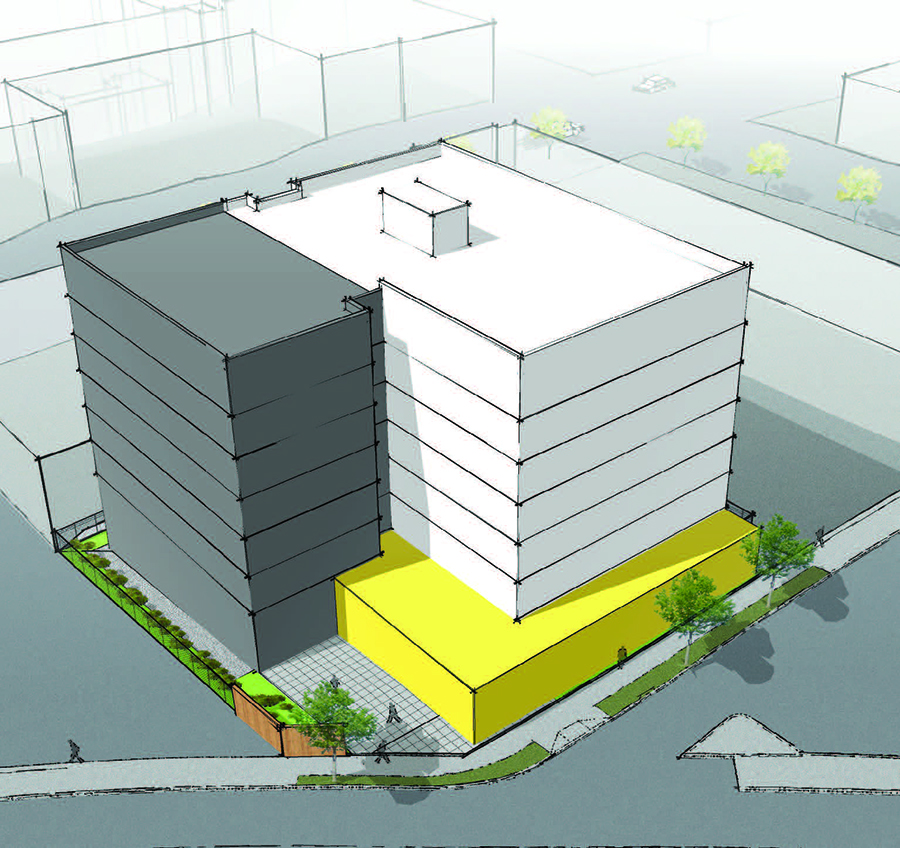By Irfan Shariff
NORTHWEST ASIAN WEEKLY
The Low Income Housing Institute (LIHI) has set its eyes on developing new affordable housing for seniors and their families in the Little Saigon area of the Chinatown-International District (CID).
“Main Street Senior Housing is the first where we are focusing on seniors aged 55 and over and their extended families. Often, senior housing is exclusively designed for singles and couples,” said Sharon Lee, executive director of LIHI.
A community meeting was held on Aug. 15 to describe the proposal, hear from the design and construction teams, and answer any questions. A similar meeting was held for affected local businesses, and more will be conducted as the development continues.

A rendering (by Studio 19) of the new seven-story building (corner of Main and Boren). Courtesy of LIHI
The project is currently in process of seeking funding for construction and, if funded, will break ground in late 2026 on the corner of Main Street and Boren Avenue. LIHI purchased the property in 2022 with a combination of state grants and private loans.
“This will make the best use of a difficult corner,” said Lee. There are currently a handful of retail businesses on the property that will be displaced.
“We understand these businesses are important to the community,” said Johnny Wheeler, project manager of housing and community development at LIHI. LIHI plans to provide relocation services that will include work advisory services and financial assistance. There are no plans to include retail space in the new development.
Hui Tian, principal at Studio 19 Architects, focuses on affordable housing design and has drafted the initial plans for Main Street Senior Housing. LIHI has also enlisted Marpac Construction for the project. Both Studio 19 and Marpac are minority-owned.
“Our goal is to create safe, welcoming homes where seniors can age in place with their families,” said Tian.
The new seven-story property plans to create approximately 70 new units of which 12 will be two- and three-bedroom apartments.
“We know many immigrant and refugee families desire to live together and support their elders. So we are trying to accommodate intergenerational families,” said Lee.
The development will also contain studios and one-bedrooms, multipurpose rooms, outdoor space, and commercial units. LIHI will expand its offices into the new building, which will sit a block over from its main office at the An Lac apartments, also a LIHI property.
LIHI maintains over 3,700 units across 82 properties throughout the greater Seattle area and some as far south as Olympia, many of which are senior housing. Some properties allow for Section 8 but plans for Main Street Housing do not include that. Section 8 often allows landlords to set market rate that is subsequently subsidized through voucher programs.
Main Street Senior Housing will serve seniors and their households that make up to 50% of the household area median income (AMI). Half of the units will be reserved for those that make up to 30% AMI and the remainder for those up to 50%. The AMI for a family of two ranges from $37,710 (30% AMI) to $62,850 (50% AMI), while maximum rent for a one-bedroom will range from $818 (30% AMI) to $1,408 (50% AMI). The rent for a three-bedroom apartment maxes out at $1,922. These figures are based on April 2025 data.
According to Lee, “Very few senior living communities enable seniors to live with their children, grandchildren, or other relatives.”
“The elders and families with children will benefit from proximity to Bailey Gatzert Elementary, nearby parks and recreation facilities, shopping and services in CID, and rich cultural anchors like the Japanese Buddhist Temples, Washington Hall, New Hope Missionary Baptist Church, and other historic Black and Asian churches in the neighborhood,” she said.
